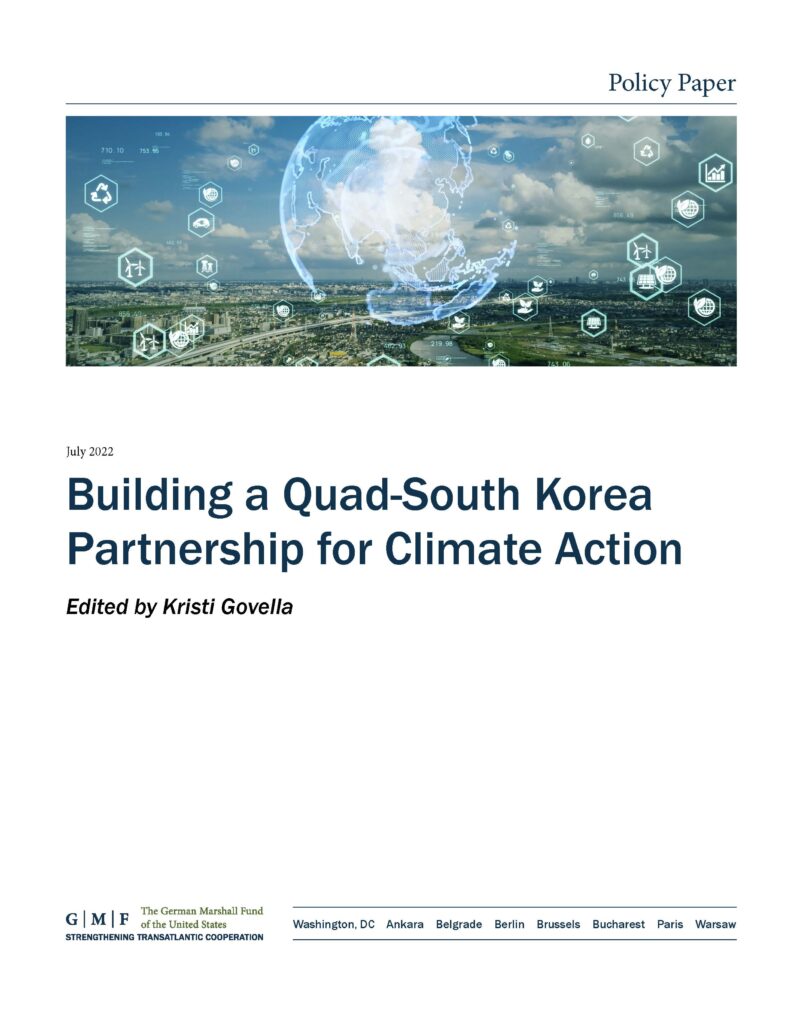
I’m happy to announce that my new edited volume Building a Quad-South Korea Partnership for Climate Action has been published. The seven contributions to this volume explore the gains that could be achieved from integrating South Korea into Quad climate initiatives, and in doing so they offer lessons for how minilateral initiatives can be expanded into broader coalitions of partners. In my introduction to the volume, I discuss its four overarching findings:
Minilateral cooperation has the potential to serve as a building block for broader regional and global initiatives. Although climate change cannot be solved by the efforts of five countries acting in isolation, minilateral efforts can be helpful in aligning national interests and policies in preparation for pursuing expanded initiatives with additional countries. The clearest example of this is the potential for the Quad countries and South Korea to form a “climate cooperation club” by creating a voluntary carbon market mechanism under Article 6 of the Paris Agreement. In this way, these five countries could enable each other to meet or even exceed their national goals for carbon reduction in a manner that fully supports their international commitments.6 Once positions are aligned among a small group of countries, this creates opportunities to coordinate their positions within other regional or international organizations to amplify and support parallel efforts to address climate change.
Sharing knowledge and best practices can promote policy effectiveness, innovation, and harmonization. There are no easy answers to the problems posed by climate change. On a fundamental level, regional and global climate information sharing about disasters and hazards needs to be improved to enable effective climate-change mitigation and adaptation. In terms of domestic policy, the governments, companies, and citizenry of these five countries have sought ways to pursue decarbonization and to integrate climate action into their broader economic and social activities. For example, the Quad countries may be able to learn from South Korea’s experience with its Green New Deal and its domestic implementation of green growth principles.7 The industries of these countries could benefit from knowledge transfer in relevant industries such as electric vehicles and renewables.8 Their local governments could also usefully consult with one another on bottom-up policies to promote decarbonization.9 By sharing knowledge, practices, and lessons learned, successful models can be emulated elsewhere and common pitfalls can be avoided.
Climate change is closely interconnected with other economic and security issues, so climate must be considered at a broad strategic level in order to effectively address problems. Climate change cannot be solved in isolation from other issues. It is already causing major cascading consequences around the globe.10 The contributions to this volume demonstrate the broad relevance and impact of climate change for a wide range of policies related to sustainable economic development, low-carbon marine and road transportation, green hydrogen and ammonia, forestry and land use, infrastructure, investment, finance, energy efficiency and conservation, renewable energy, climate information, humanitarian assistance, disaster relief, food security, population displacement, and regional and global institutions. Addressing climate change effectively will require a holistic strategic view of climate as it relates to other substantive issues and a whole-of-society approach to finding solutions. Governments such as the Biden administration in the United States have already begun to embed climate change in their broader regional strategies in reflection of this realization.11
It is not necessary for South Korea or other potential partners to join the Quad to achieve gains from cooperation. None of the initiatives or proposals discussed in this volume require South Korea to join the Quad; nor would other potential partner countries need to do so in order to engage in joint climate action. Instead, flexible consultation, coordination, and cooperation between these countries can be used to achieve meaningful progress in addressing issues related to climate change. Moreover, non-member countries around the world will benefit from the gains realized from climate cooperation within groupings such as the Quad since their initiatives will generate non-excludable positive externalities such as reduced carbon generation.
At a time when the international system is shifting away from global multilateral institutions and entering an era of minilateralism, countries are placing their hopes in groupings like the Quad to play a role in addressing pressing problems such as climate change. The true test of these small-scale initiatives, however, will be their ability to build coalitions with external partners to achieve their ambitious goals. This volume offers some insights into the complexity of this process, as well as concrete recommendations for moving forward.
